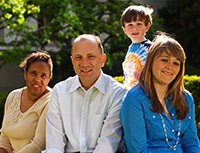By Jim Donovan
In 2002 my good friend died of cancer. He and I were at MIT together as undergraduates, where we shared a lot of great memories and developed a long-lasting friendship. Like most of us who walk with a loved one through a life-threatening disease, I experienced feelings of anger, sadness, and fear. I don’t have a medical background, and honestly didn’t understand some of the terminology that doctors used during the diagnosis and the treatment. This made me feel helpless. But I wanted to help. So I discovered other ways I could support my friend.
First and foremost, I tried to keep him positive and make him as comfortable as possible. I brought him the food he liked, watched movies with him, and stayed up late talking with him when he was sad and discouraged. I also tried to bring humor to his day because, as everyone knows, laughter is powerful medicine. I spent as much time with him as I could, depending on his needs and those of his family, and made sure to plan things for the future that he could look forward to. I reassured his wife that I would do anything to help her so his most important source of strength and comfort felt supported, too. And, so he would feel as informed as possible, I researched other patients in similar positions with the same cancer, and shared what I learned about their experiences.
Read more

 Faced with an abundance of cancer stories in the news and our own personal experiences with cancer, we may fear that there’s a growing “epidemic” of the disease.
Faced with an abundance of cancer stories in the news and our own personal experiences with cancer, we may fear that there’s a growing “epidemic” of the disease.